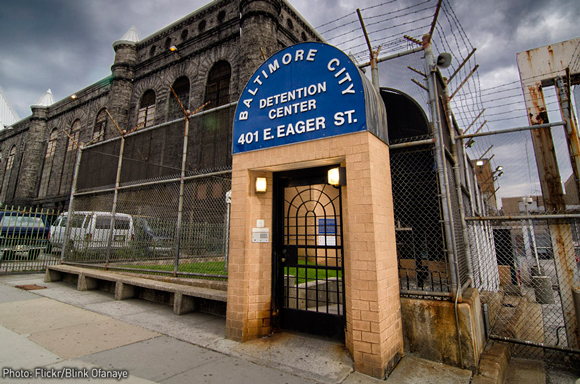ACLU Forces Sweeping Improvements At Baltimore City Jail
Detainee Medical And Mental Health Care Will Improve As A Result Of Agreement To Settle Longstanding Lawsuit
FOR IMMEDIATE RELEASE
CONTACT: (212) 549-2666; media@aclu.org
BALTIMORE – The American Civil Liberties Union and the Baltimore-based Public Justice Center today announced an agreement with Maryland state officials that will lead to dramatic improvements in the quality of medical and mental health care provided to detainees at the Baltimore City Jail and effectively settles major portions of a longstanding class-action lawsuit.
"This agreement will help ensure that all detainees receive the kind of medical and mental health care that they are constitutionally entitled to, and state officials credit for agreeing to these improvements," said Elizabeth Alexander, Director of the ACLU National Prison Project. "Detainees have been forced to endure undue pain and suffering for far too long, and the hope is that this agreement will go great lengths towards alleviating the neglect of their medical needs by jail officials."
As a result of the settlement agreement, filed today in U.S. District Court for the District of Maryland, detainees will receive responses to sick calls within 72 hours, jail officials will be required to provide ongoing treatment to detainees with chronic diseases, an on-site psychiatrist will be available to detainees five days a week and detainees with disabilities will be provided with necessary housing supplies.
Additionally, jail officials will ensure that detainees continue to receive any necessary medications prescribed to them prior to their arrival at the jail and that those prescriptions are renewed without interruption. The agreement also requires jail officials to fix any broken plumbing in a timely manner so that public health within the jail is not threatened.
"We are hopeful that this settlement will not only effectively provide access to health care for those in the jail but will also address a serious public health concern for the city of Baltimore," said Wendy Hess, an attorney with the Public Justice Center. "Given the tens of thousands of people with treatable, chronic and often communicable diseases that move in and out of the jail every year, this agreement affects the health of everyone in the city."
The ACLU, along with the Public Justice Center, filed a motion in 2003 to reopen the medical and physical plant sections of a consent decree that had been brokered in the case, Duvall v. O'Malley, which dates back more than three decades. At the time, statements from a medical expert and numerous current and former detainees revealed a pervasive lack of medical and mental health care, as well as dangerous and unsanitary living conditions in the jail. A district court judge agreed to reopen the case in 2004, and the ACLU and the Public Justice Center began settlement negotiations in 2007.
The jail has been riddled with problems for years resulting from the failure of jail officials to provide necessary medical treatment. Detainees with uncontrolled and untreated diabetes have died, a detainee with a history of cancer went three months without having a suspicious lump in her breast diagnosed and detainees have gone months without receiving needed medications upon entering the jail. A 2008 Department of Justice report found multiple examples of women not getting timely access to care, and a 2007 report by the Maryland Office of Legislative Audits found that 10 percent of detainees with chronic medical conditions went at least six months between medical examinations and 39 percent of detainees that were given examinations did not received requested medical treatment within established timeframes.
Approximately 40,000 people pass through the jail per year, and the jail's average daily population is about 4,500.
Additional information about the ACLU National Prison Project is available online at: www.aclu.org/prison
Additional information about the ACLU of Maryland is available online at: www.aclu-md.org
Additional information about the Public Justice Center is available online at: www.publicjustice.org


